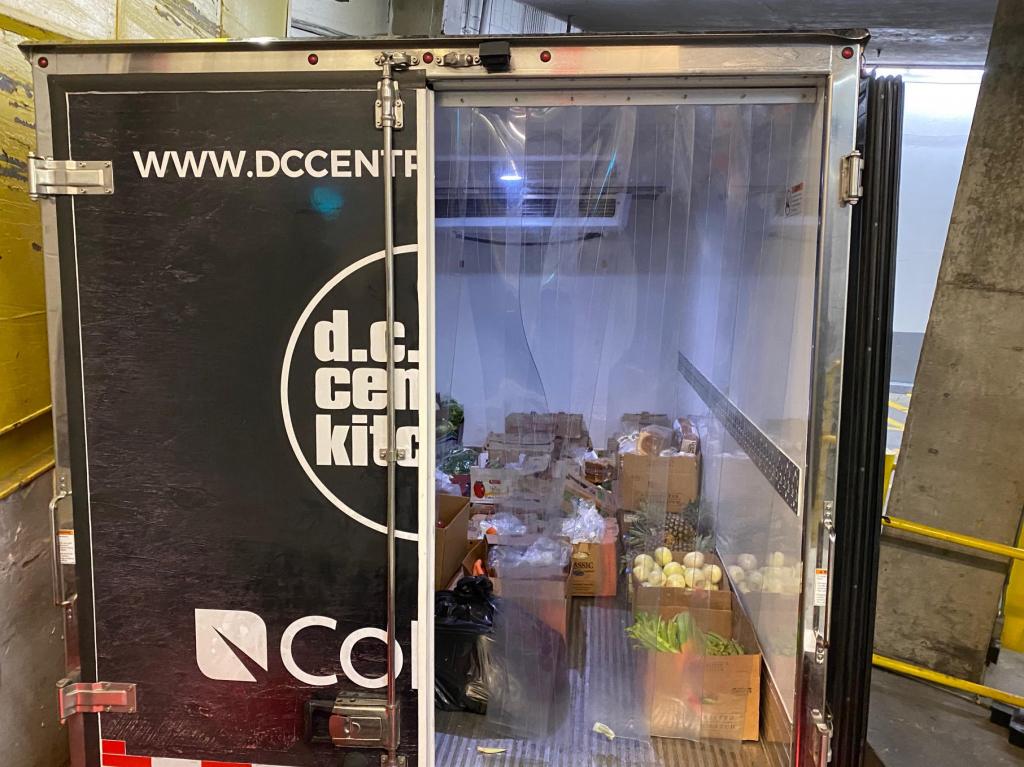Club helps older members, community during pandemic
Kate Helster is taking her job as National Press Club membership director seriously as the Club contends with the shutdown during the coronavirus pandemic.
She and her husband, Nathan, delivered the first supply of food to an older Club member who took advantage of the Club’s new plan to assist members reluctant to go out.
“We can’t offer our members a physical location where they can gather,” she said. "What we can offer our members is a sense of community and what they need right now.”
While the Clubhouse doors are closed, the staff and Board of Governors are looking for ways to keep members engaged while they are sheltering in place.

They also are reaching out to the larger Washington D.C., community by clearing out the Club’s cabinets and refrigerators of food that can be used by the D.C. Central Kitchen to feed children forced to stay home from school.
In the original constitution of the Club adopted March 29, 1908, among other priorities, the founding members included “aid members in distress.”
Unique moment in Club history
This is a unique moment in the Club’s history. It has never closed its doors – not for wars, or the Great Depression, or riots in downtown Washington, not even when the Spanish flu killed hundreds of thousands of Americans.
Even in the 9-11 terrorist attacks, the Club closed early that day, as thousands of people fled downtown Washington, but it reopened the next morning.
In thinking what it could do at this time, the first need seemed to be helping older members who are most vulnerable to the virus and who may have the hardest time getting food and medicine.
Some 400 to 450 Club members are between 70 and 90 years old, considered the most vulnerable in the pandemic. Laura Coker, director of membership engagement, began contacting each of them, saying “we’re here for you if you need a hand doing something and you are not feeling like you should be going out.”
Grocery deliveries
Already, 15 members of the staff, board members and some young members have volunteered to be drivers. Those older members can contact the Club with their grocery needs, and the Club can order them online from a store close to the member’s house, bill it to the member’s Club account, and then send a driver to pick them up.
The response has been overwhelmingly appreciative, Helster and Coker said.
“You’re the first of the organizations to which I belong to do anything like that,” emailed member Sam Holt. “How ‘First Amendment’ of you to support both press and assembly.”
Helster expects an increase in requests for assistance.
“Not many have taken us up on the offer, but a lot said if this goes on for any length of time, we will take you up on it,” she said, especially if the emergency extends through April and into May.
The first member to ask for assistance was John Rahming, 82, who lives with his wife, Penelope, in Alexandria. John suffers from Parkinson disease and Penelope is reluctant to face the stores.
“We were terribly grateful to the lovely couple who did some shopping for us,” said Rahming, who made sure Helster saw his membership card showing all of the stickers going back 21 years. “We hope to see more of them.”
Donations to DC Central Kitchen
At the same time, in the Club’s kitchen, Executive Chef Susan Delbert was trying to decide what to do with all of the perishable food that had been ordered before the Club was forced to close for in-person activities.
Delbert knew of the work that DC Central Kitchen does in training the unemployed in food preparation and feeding the homeless. During this emergency, the Kitchen is working with the city of Washington to provide food for children who cannot take advantage of the free and reduced lunch program now that the schools are closed.
Miguel Dominguez, director of the Club House Operations, said he worked with Executive Sous Chef Moe Aguilera, Second Sous Chef Wil Reyes, and co-director of banquets David Deem to sort through the food and decide what should go.
Dominquez ticked off the items that were loaded onto large carts and pushed to the elevators: apples, pears, tomatoes, asparagus, melons, green beans, broccoli, spices, some mushrooms, carrots, zucchini, salad mix, lemons, limes, eggs and dairy, orange juice, lots of bread -- whole wheat, rye, dinner rolls, avocados and eggplants.
In all, hundreds of pounds of food made it to DC Central Kitchen’s waiting refrigerated truck to be turned into nutritious meals for hungry school-aged children.
“If you are sitting at home and wondering what you can do, it is simple to help your neighbor and your community and to help anyone who is in need,” Dominguez said. “When this is all over, the underlying memory should be what did we all do to help each other.”
Club President Michael Freedman lauded these efforts.
“The National Press Club’s spirit of community has never shined brighter than now, as evidenced by this above-and-beyond effort by our dedicated staff and members,” Freedman said. "While we have dedicated this year to helping the world better understand why journalism matters, this show of support for our senior members and children in the broader community demonstrates so beautifully why the National Press Club matters.”
